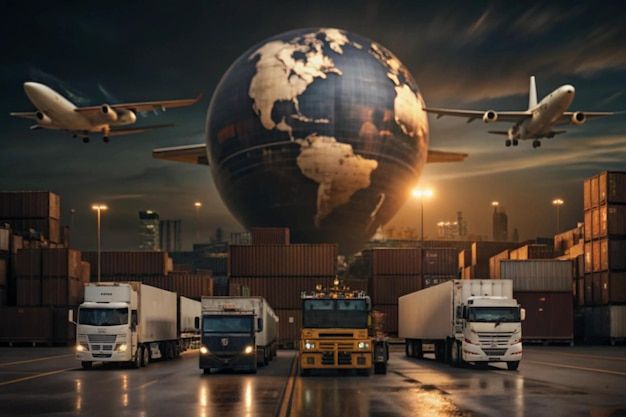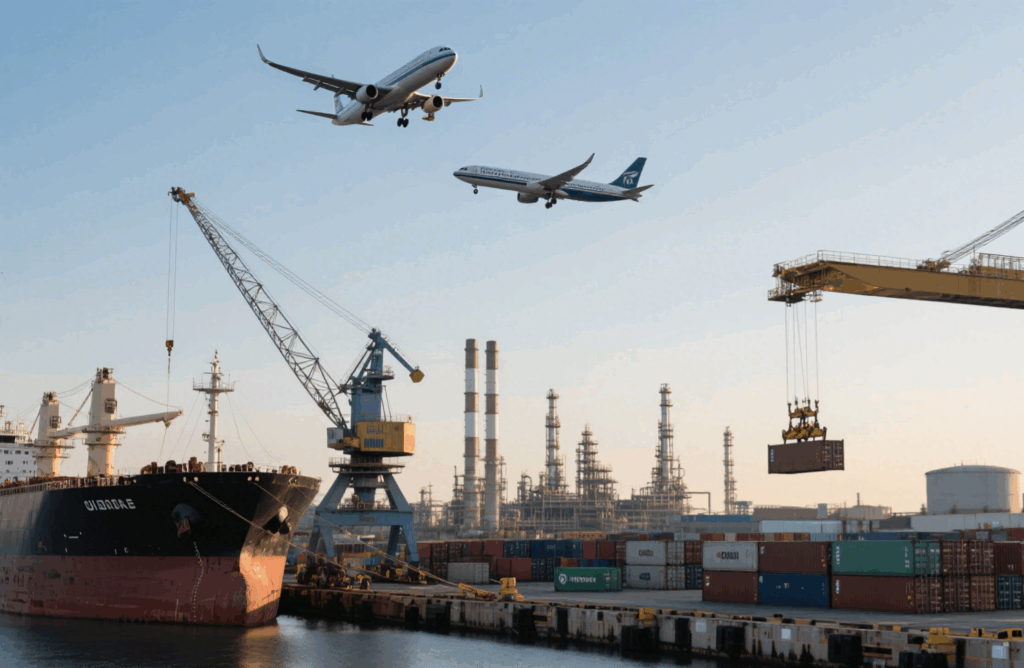Working with a reliable China freight forwarder is essential for importers who want cost-effective, timely, and compliant international shipping. Although many businesses source products from China, logistics complexities such as customs clearance, Incoterms, and transit times can be overwhelming. A professional freight forwarder simplifies supply chain management, balancing costs, reliability, and speed.
What Is a China Freight Forwarder?
A China freight forwarder is a logistics partner that arranges transportation, consolidates cargo, manages customs documentation, and ensures safe delivery.
- Roles: booking carriers, handling export/import clearance, providing insurance, and organizing multimodal shipments.
- Modes: sea freight, air freight, rail freight, and express courier.
- Specialization: navigating Chinese ports (Shanghai, Shenzhen, Ningbo, Qingdao) and connecting them to global markets.
Moreover, forwarders offer flexibility for both large corporations and SMEs.
Why Should You Use a Freight Forwarder in China?
- Local presence: offices in major Chinese export hubs.
- Cost savings: access to wholesale freight rates.
- Risk reduction: expertise in customs and documentation.
- Flexibility: ability to manage both FCL and LCL shipments.
Therefore, choosing a China-based forwarder reduces stress and avoids costly mistakes.
How Do Freight Forwarders Work in China?
The shipping process typically includes:
- Supplier coordination: cargo collected from factories.
- Export clearance: documentation submitted to Chinese customs.
- International transport: sea, air, or rail freight booked.
- Import clearance: duties, VAT, or GST processed.
- Last-mile delivery: goods delivered to warehouses, stores, or Amazon FBA.
As a result, freight forwarders act as the link between suppliers and global buyers.
What Are the Main Shipping Methods from China?
| Method | Avg. Cost | Transit Time | Pros | Cons |
|---|---|---|---|---|
| Sea Freight (FCL) | USD 2,000–3,500/40HQ | 25–35 days | Cheapest per unit | Slow |
| Sea Freight (LCL) | USD 150–250/CBM | 28–38 days | Flexible for SMEs | Risk of delays |
| Air Freight | USD 5–8/kg | 5–8 days | Fast | Expensive |
| Express Courier | USD 8–12/kg | 3–5 days | Simple door-to-door | Very costly |
| Rail Freight (EU only) | USD 6,500–8,500/40HQ | 15–20 days | Mid-cost & mid-speed | Limited routes |
Accordingly, forwarders advise on the best solution depending on cost, urgency, and cargo type.

How Long Does Shipping Take from China?
| Destination | Sea Freight | Air Freight | Rail Freight (EU) |
|---|---|---|---|
| USA (West Coast) | 18–22 days | 7 days | N/A |
| USA (East Coast) | 28–32 days | 8–9 days | N/A |
| UK / Germany | 30–35 days | 8–9 days | 16–20 days |
| Australia | 18–22 days | 6–7 days | N/A |
| Canada | 25–30 days | 8 days | N/A |
Thus, air is best for urgent orders, while sea remains most cost-effective.
What Documents Are Required for China Exports?
| Document | Purpose |
|---|---|
| Commercial Invoice | Declares product value |
| Packing List | Lists cartons, weight, dimensions |
| Bill of Lading / Air Waybill | Contract of carriage |
| Certificate of Origin | Determines duties/tariffs |
| Importer of Record | Needed for customs clearance |
| HS Codes | Basis for duty and tax |
In addition, compliance ensures smooth passage through customs authorities worldwide.

Real Case Studies: Freight Forwarding from China
Case 1: Shenzhen → Los Angeles (Electronics)
- Cargo: 40HQ container with 20 tons of devices
- Mode: FCL sea freight
- Cost: USD 3,200
- Transit Time: 19 days
- Benefit: Stable, low-cost logistics solution for bulk imports.
Case 2: Ningbo → London (Furniture)
- Cargo: 10 CBM furniture, SME client
- Mode: LCL sea freight
- Cost: USD 1,750
- Transit Time: 32 days
- Benefit: Affordable option without needing a full container.
How Much Does a China Freight Forwarder Charge?
| Service | Avg. Fee | Notes |
|---|---|---|
| Documentation | USD 50–150 | Export paperwork |
| Customs Clearance | USD 100–300 | Varies by country |
| Sea Freight (20GP) | USD 1,500–2,000 | Per container |
| Sea Freight (40HQ) | USD 2,800–3,500 | Per container |
| Air Freight | USD 5–8/kg | Volume-sensitive |
| Courier | USD 8–12/kg | For urgent small orders |
Therefore, businesses must consider both freight charges and forwarding service fees.

What Are the Pros and Cons of Freight Modes?
| Mode | Pros | Cons |
|---|---|---|
| Sea Freight | Cheapest, high capacity | Slow transit |
| Air Freight | Fastest, secure | Expensive |
| Courier | Easy door-to-door | Unsuitable for bulk |
| Rail Freight | Balanced cost/speed | Only EU routes |
Hence, a good forwarder tailors recommendations to customer needs.
How Can a China Freight Forwarder Save Costs?
- Consolidating LCL shipments
- Negotiating bulk carrier rates
- Recommending optimal Incoterms (FOB, CIF, DDP)
- Handling customs correctly to avoid penalties
- Advising on packaging to reduce dimensional weight
Consequently, working with an experienced partner improves both efficiency and profitability.
What Are the Risks of Not Using a Freight Forwarder?
- Misdeclared goods → customs penalties
- Incorrect labeling → shipment rejections
- Missed schedules → delays and higher storage fees
- Overpaying → lack of negotiated rates
Therefore, relying on professionals minimizes supply chain disruptions.
Conclusion
In summary, working with a professional China freight forwarder provides businesses with cost savings, reliable schedules, and simplified customs clearance. Real-world cases show how FCL, LCL, and air freight solutions adapt to different needs.
Without a doubt, forwarders are indispensable partners for managing supply chains from China. Importers should compare rates, evaluate services, and choose experienced freight forwarders to ensure smooth global trade.
- Consult TJ China Freight Forwarding for the lowest quote. They will provide you with reliable, cost-effective service.
FAQs
Q1.Can small e-commerce sellers benefit from using a China freight forwarder?
Yes, freight forwarders consolidate LCL shipments, helping e-commerce sellers reduce logistics costs while ensuring compliance with customs regulations.
Q2.Do China freight forwarders arrange Amazon FBA deliveries?
Indeed, many forwarders specialize in Amazon FBA logistics, handling labeling, palletization, and direct deliveries to Amazon warehouses.
Q3.What Incoterms are best when working with a China freight forwarder?
FOB offers flexibility for buyers, CIF includes insurance, while DDP simplifies imports by covering duties and last-mile delivery.
Q4.Can freight forwarders provide cargo insurance for shipments from China?
Absolutely, most forwarders offer marine or air cargo insurance to protect goods against loss, theft, or damage in transit.
Q5.How does peak season affect costs with a China freight forwarder?
During Q4 and Chinese New Year, freight rates rise sharply; booking early secures space and keeps shipping costs manageable.

